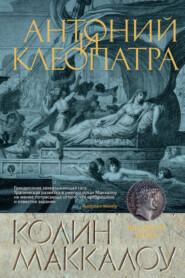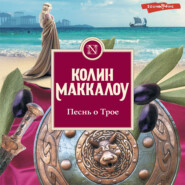По всем вопросам обращайтесь на: info@litportal.ru
(©) 2003-2024.
✖
Antony and Cleopatra
Автор
Год написания книги
2019
Настройки чтения
Размер шрифта
Высота строк
Поля
‘My dear Sextus, you will never wear Octavianus down,’ said Maecenas, turning up in Agrigentum a few days later. ‘He has no weaknesses for you to work on.’
‘Gerrae!’ Sextus snapped. ‘To start with, he has no ships and no admirals worthy of the name. Fancy sending an effete Greek freedman like Helenus to wrest Sardinia off me! I have the fellow here, by the way. He’s safe and unharmed. Ships and admirals – two weaknesses. He has no money, a third. Enemies in every walk of life – four. Shall I go on?’
‘They’re not weaknesses, they’re deficiencies,’ said Maecenas, savoring a mouthful of tiny shrimps. ‘Oh, these are delicious! Why are they so much tastier than the ones I eat in Rome?’
‘Muddier waters, better feeding grounds.’
‘You do know a lot about the sea.’
‘Enough to know that Octavianus can’t beat me on it, even if he did find some ships. Organizing a sea battle is an art all its own, and I happen to be the best at it in Rome’s entire span of history. My brother, Gnaeus, was superb, but not in my class.’ Sextus sat back and looked complacent.
What is it about this generation of young men? wondered the fascinated Maecenas. At school we learned that there would never be another Scipio Africanus, another Scipio Aemilianus, but each of them was a generation apart, unique in his time. Not so today. I suppose the young men have been given a chance to show what they can do because so many men in their forties and fifties have died or gone into permanent exile. This specimen isn’t thirty yet.
Sextus came out of his self-congratulatory reverie. ‘I must say, Maecenas, that I’m disappointed that your master didn’t come to see me in person. Too important, is he?’
‘No, I assure you,’ said Maecenas, at his oiliest. ‘He sends his profuse apologies, but something has come up in Further Gaul that made his presence there mandatory.’
‘Yes, I heard, probably before he did. Further Gaul! What a cornucopia of riches will become his! The best of the veteran legions, grain, hams and salt pork, sugar beets … Not to mention the land route to the Spains, though he doesn’t have Italian Gaul yet. No doubt he will when Pollio decides to don his consular regalia, though rumor has it that won’t be for some time. Rumor has it that Pollio is marching his seven legions down the Adriatic coast to assist Antonius when he lands at Brundisium.’
Maecenas looked surprised. ‘Why should Antonius need military help to land in Italia? As the senior of the Triumvirs, he’s free to come and go as he pleases.’
‘Not if Brundisium has anything to do with it. Why do the Brundisians hate Antonius so? They’d spit on his ashes.’
‘He was very hard on them when Divus Julius left him behind there to get the rest of the legions across the Adriatic the year before Pharsalus,’ said Maecenas, ignoring the darkening of Sextus’s face at mention of the battle that had seen his father crushed, the world changed. ‘Antonius can be unreasonable, never more so than at that time, with Divus Julius breathing down his neck. Besides, his military discipline was slack. He let the legionaries run wild – raping, looting. Then, when Divus Julius made him Master of the Horse, he took out a lot of his spleen at Brundisium on Brundisium.’
‘That would do it,’ said Sextus, grinning. ‘However, it does look a bit like an invasion when a Triumvir brings his entire army with him.’
‘A show of strength, a signal to Imperator Caesar—’
‘Who?’
‘Imperator Caesar. We don’t call him Octavianus. Nor does Rome.’ Maecenas looked demure. ‘Perhaps that’s why Pollio hasn’t come to Rome, even as her elected junior consul.’
‘Here’s some less palatable news for Imperator Caesar than Further Gaul,’ Sextus said waspishly. ‘Pollio has won Ahenobarbus over to Antonius’s side. Won’t Imperator Caesar love that!’
‘Oh, side, side,’ Maecenas exclaimed, but without passion. ‘The only side is Rome’s. Ahenobarbus is a hothead, Sextus, as you well know. He “belongs” to nobody save Ahenobarbus, and he revels in roaring up and down his little patch of sea playing at being Father Neptune. No doubt this means you’ll be having more to do with Ahenobarbus yourself in future?’
‘I don’t know,’ said Sextus, looking inscrutable.
‘More to the point, that busy bird rumor says that you’re not getting on well with Lucius Staius Murcus these days.’
‘Murcus wants the co-command,’ Sextus said before he could put a brake on his tongue. That was the trouble with Maecenas, he lulled his listeners into a cosy rapport that somehow turned him from Octavian’s creature into a trusted friend. Annoyed at his indiscretion, Sextus tried to pass it off with a shrug. ‘Of course he can’t have the co-command, I don’t believe in them. I succeed because I make all the decisions myself. Murcus is an Apulian goatherder who thinks he’s a Roman nobleman.’
Look at who’s talking, thought Maecenas. So it’s goodbye to Murcus, eh? By this time next year he’ll be dead, accused of some transgression or other. This haughty young reprobate brooks no equals, hence his predilection for freedmen admirals. His romance with Ahenobarbus won’t last any longer than it takes Ahenobarbus to call him a Picentine upstart.
All useful information, but not why he was here. Abandoning the shrimps and the fishing for news, Maecenas got down to his real business, which was to make it clear to Sextus Pompey that he had to give Octavian and Italia a chance to survive. For Italia, that meant full bellies; for Octavian, that meant hanging on to what he had.
‘Sextus Pompeius,’ Maecenas said very earnestly two days later, ‘it is not my place to sit in judgement upon you, or upon anyone else. But you cannot deny that the rats of Sicilia eat better than the people of Italia, your own country from Picenum, Umbria and Etruria to Bruttium and Calabria. Home of your city, which your father adorned for such a long time. In the six years since Munda you’ve made thousands of millions of sesterces reselling wheat, so it isn’t money you’re after. But if, as you insist, it is to force the Senate and People of Rome to restore your citizenship and all its attendant rights, then surely you must see that you will require powerful allies inside Rome. In fact, there are only two who wield the power necessary to help you – Marcus Antonius and Imperator Caesar. Why are you so determined that it be Antonius, a less rational and, if I dare say it, a less reliable man than Imperator Caesar? Antonius called you a pirate, wouldn’t listen to Lucius Libo when you made the overtures. Whereas now it is Imperator Caesar making the overtures. Doesn’t that shout his sincerity, his regard for you, his wish to help you? You’ll hear no aspersions about pirates from Caesar Imperator’s lips! Cast your vote for him! Antonius is not interested, and that’s unarguable. If there are sides to choose, then choose the right one.’
‘All right,’ Sextus said, sounding angry. ‘I’ll cast my vote for Octavianus. But I require concrete guarantees that he’ll work for me in the Senate and Assemblies.’
‘Imperator Caesar will do that. What evidence of his good faith will satisfy you?’
‘How would he feel about marrying into my family?’
‘Overjoyed.’
‘He has no wife, I understand?’
‘None. Neither of his marriages was consummated. He felt that the daughters of strumpets might become strumpets themselves.’
‘I hope he can get it up for this one. My father-in-law, Lucius Libo, has a sister, a widow of the utmost respectability. You can take her on approval.’
The pop-eyes widened even more, as if the news of this lady came as a thrilling surprise. ‘Sextus Pompeius, Imperator Caesar will be honored! I know something of her … eminently suitable.’
‘If the marriage goes through, I’ll let the African grain fleets go through. And I’ll sell all comers from Octavianus to the smallest dealer my wheat at thirteen sesterces the modius.’
‘An unlucky number.’
Sextus grinned. ‘For Octavianus, maybe, but not for me.’
‘You never can tell,’ said Maecenas softly.
When Octavian set eyes on Scribonia he was secretly pleased, though the few people present at their wedding would never have guessed it from his unsmiling demeanor and the careful eyes that never gave away his feelings. Yes, he was pleased. Scribonia didn’t look thirty-three, she looked his own age, twenty-three next birthday. Her hair and eyes were dark brown, her smooth skin clear and milky, her face pretty, her figure excellent. She had not worn the flame and saffron of a virgin bride, but chosen pink in gauzy layers over a cerise petticoat. The scant words they exchanged at the ceremony revealed that she wasn’t shy, but was not a chatterbox either, and further conversation afterward told him that she was literate, well read, and spoke much better Greek than he did. Perhaps the only quality that gave him qualms was her sense of the ridiculous. Not owning a well-developed sense of humor himself, Octavian feared those who did, especially if they were women – how could he be sure they weren’t laughing at him? Still, Scribonia was hardly likely to find a husband so far above her station as the son of a god humorously or peculiarly funny.
‘I’m sorry to part you from your father,’ he said.
Her eyes danced. ‘I’m not, Caesar. He’s an old nuisance.’
‘Really?’ he asked, startled. ‘I’ve always believed that parting from her father is a blow for a female.’
‘That particular blow has fallen twice before you, Caesar, and each time it falls, it hurts less. At this stage, it’s more a pat than a slap. Besides, I never imagined that my third husband would be a beautiful young man like you.’ She giggled. ‘The best I was hoping for was a spry eighty-year-old.’
‘Oh!’ was all he could manage, floundering.
‘I heard that your brother-in-law Gaius Marcellus Minor has died,’ she said, taking pity on his confusion. ‘When should I go to pay my condolences to your sister?’
‘Yes, Octavia was sorry not to be able to come to my wedding, but she’s overcome with grief, quite why I don’t know. I think emotional excesses are a trifle unseemly.’
‘Oh, not unseemly,’ she said gently, discovering more about him by the moment, and a part of her dismayed at what she learned. Somehow she had envisioned Caesar as in the mold of a Sextus Pompeius – brash, conceited, callow, very male, somewhat smelly. Instead she had found the composure of a venerable consular laid atop a beauty that she suspected would come to haunt her. His luminous, silvery eyes honed his looks to spectacular, but they hadn’t gazed on her with any desire. This was his third marriage too, and if his behavior in sending his two previous wives back to their mothers untouched was anything to go by, these political brides were accepted from necessity, then placed in storage to be returned in the same condition as they came in. Her father had told her that he and Sextus Pompey had a bet going: Sextus had laid long odds that Octavian wouldn’t go through with it, whereas Libo believed that Octavian would go through with it for the sake of the people of Italia. So if the marriage was consummated and issue resulted to prove that, Libo stood to win a huge sum. News of the bet had made her rock with laughter, but she knew enough of Octavian already to know that she didn’t dare tell him about it. Odd, that. His uncle Divus Julius would have shared her mirth, from what she knew about him. Yet in the nephew, not a spark.
‘You may see Octavia at any time,’ he was saying to her, ‘but be prepared for tears and children.’
That was all the conversation they managed to hold together before her new serving maids put her into his bed.
The house was very large and made of gloriously colored marbles, but its new owner hadn’t bothered furnishing it properly or hanging any paintings on the walls in places clearly designed for that purpose. The bed was very small for such a huge sleeping room. She had no idea that Hortensius had abhorred the tiny cubicles Romans slept in, so caused his own sleeping room to be the size of another man’s study.
‘Tomorrow your servants will install you in your own suite of rooms,’ he said, getting into the bed in pitch darkness; he had snuffed out the candle in the doorway.














